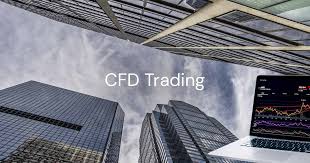CFD trading or Contract for Difference trading is a popular investment option worldwide. It is a form of derivatives trading that allows traders to speculate on the price movements of an underlying asset without actually owning it. CFD trading involves a contract between the trader and the broker, based on the price movements of the asset. In simpler terms, it enables traders to profit from both rising and falling stock prices, as long as they make the right predictions. In this blog post, we will discuss everything you need to know about cfd trading.
How CFD Trading Works: In CFD trading, a trader agrees with a broker to exchange the difference in the opening and closing price of an underlying asset, without owning the asset. CFDs can be traded on a wide range of assets, including stocks, commodities, currencies, and indices. When a trader enters into a CFD trade, the broker will require him/her to put up a margin, which is usually a percentage of the contract value. The margin acts like collateral, allowing traders to trade with more leverage than their initial investment. The leverage can be beneficial when the markets go in the favorable direction, but it can also amplify losses when the market doesn’t move in the trader’s favor.
Benefits of CFD Trading: CFD trading offers numerous benefits to traders, such as access to a broad range of markets, including international markets, low transaction costs, high liquidity, and the ability to trade on both rising and falling markets. CFD trading is also highly flexible, allowing traders to tailor their trades to their specific needs, goals, and strategies. Additionally, CFD trading enables traders to use a wide range of trading tools and platforms, including mobile trading apps, algorithmic trading, risk management tools, and advanced charting tools.
Risks of CFD Trading: As with any form of investment, CFD trading also involves risks, and traders should always be aware of them. The primary risk of CFD trading is market risk, i.e., the risk that the markets may move against a trader’s trade, leading to losses. The leverage used in CFD trading can also amplify the risk of large losses. Additionally, CFD trading also involves counterparty risk, which refers to the risk that the broker may default on the contract. Traders should always choose reliable and regulated brokers to minimize this risk.
Tips for Successful CFD Trading: Successful CFD trading requires knowledge, skills, and discipline. Traders must have a deep understanding of the markets they trade, as well as of technical and fundamental analysis. They should also have a solid trading plan, including proper risk management strategies, trading goals, and a trading journal to track their progress. Successful traders also keep up with the latest news and developments in the markets, as well as with the regulations governing CFD trading.
CFD Trading vs. Other Forms of Trading: CFD trading is a unique form of trading that has some similarities and differences compared to other forms of trading, such as stocks, forex, and options trading. CFD trading allows traders to use leverage and trade on both rising and falling markets, whereas stock trading involves owning shares of a company and profiting from their price appreciation. Forex trading involves speculating on the exchange rate of two currencies, while options trading allows traders to buy or sell options contracts on an underlying asset. Each form of trading has its own risks and benefits, and traders should choose the one that aligns with their goals and preferences.
Conclusion:
CFD trading is a versatile and exciting form of derivatives trading that offers traders plenty of opportunities and benefits. It can be an effective way to diversify a portfolio, hedge against market volatility, and generate profits. However, traders should always be aware of the risks involved, including leverage risk, counterparty risk, and market risk. To succeed in CFD trading, traders must have solid knowledge, skills, and discipline, as well as a reliable and regulated broker. By following the tips and guidelines provided in this blog post, traders can enhance their chances of success in CFD trading.
